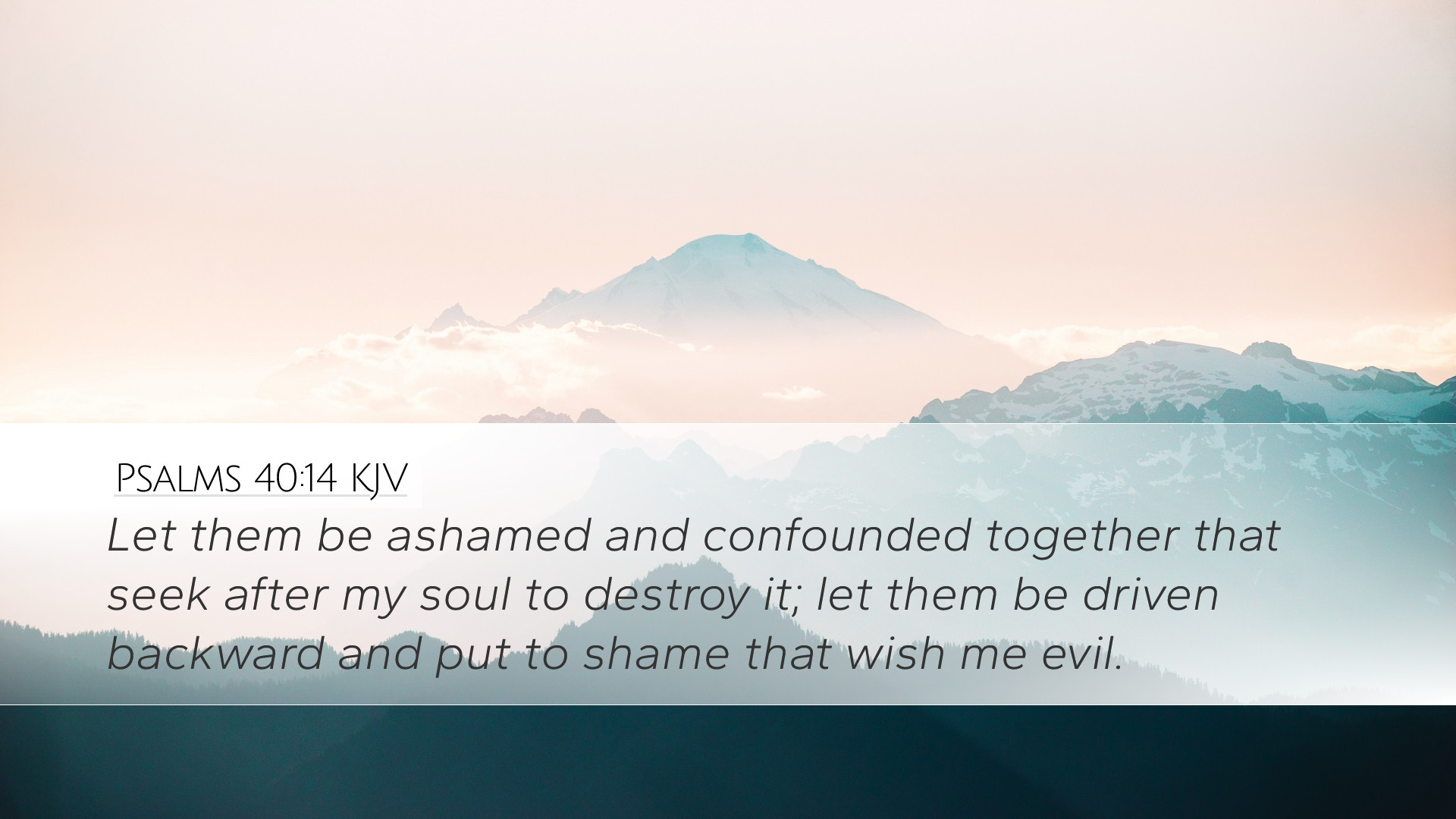Psalms 40:14 Commentary
Psalms 40:14 states, "Let them be ashamed and confounded together that seek after my soul to destroy it; let them be driven backward and put to shame that wish me evil." This verse exemplifies a plea for divine intervention against adversaries. Below, we delve into insights from various public domain commentaries to gain a multifaceted understanding of its implications.
General Context of the Psalm
This psalm is attributed to David and reflects a moment of deep personal anguish and distress brought upon by adversaries. It is both a prayer and a lament, where the author appeals to God for assistance against those who wish him harm. The psalm can be seen as a representation of the broader human experience of suffering and the hope for divine justice.
Insights from Matthew Henry
Matthew Henry notes the emotional state of the psalmist who is not only suffering but is also under attack from those who seek his life. He addresses God not just as a personal companion in his struggles but as the ultimate judge of his circumstances.
- Divine Retribution: Henry emphasizes that the psalmist expects God to act against his enemies. He articulates a principle prevalent in Hebrew poetry, where the prayer for the downfall of the wicked also serves to elevate the righteous.
- Shame as a Consequence: The concept of shame is pivotal in this verse. Henry asserts that shame is a significant part of God’s judgment and that the adversaries seeking to harm the psalmist will suffer the consequences of their wicked intentions.
Insights from Albert Barnes
Albert Barnes provides a theological examination of the nature of the psalmist's request for justice. He points out that this plea is not merely a cry for vengeance, but an appeal for the vindication of righteousness.
- The Request for Shame: Barnes argues that there is a deep spiritual significance in the desire for enemies to be put to shame. It illustrates the psalmist's understanding of the moral order that God presides over, in which good is rewarded, and evil is punished.
- Theological Implications: There is also a reflection on the connection between pride and shame. Those who pursue the psalmist with malicious intent are ultimately illustrating their own moral failures, and Barnes suggests that their shame serves as a testimony to their wickedness.
Insights from Adam Clarke
Adam Clarke’s commentary dives into the literary aspects of the psalm, considering its poetic structure and emotional depth.
- Expression of Despair: Clarke remarks on the intensity of the psalmist’s despair as he confronts his enemies. This despair becomes a platform for an earnest appeal to God.
- Backwardness as a Symbol: The phrase "driven backward" captured Clarke’s attention as an image of retreating from a position of aggression. It showcases the psalmist’s desire for enemies to experience defeat and adds a layer of hope that restoration comes after adversity.
The Significance of the Plea
The plea articulated in Psalms 40:14 lays on the foundation of trust and belief in divine justice. It mirrors an age-old request by the faithful for vindication amidst strife and a reminder that God is a refuge in trouble. The following aspects highlight the importance of this verse:
- The Role of God as Advocate: Throughout the Old Testament, God is portrayed as an advocate for His people. This verse reiterates the call for God’s intervention not solely for personal grievance but to uphold the cause of righteousness.
- Interpersonal Dynamics of Conflict: The mention of shame connects to the communal aspect of conflicts and their moral implications. The psalm resonates with a call for community awareness regarding justice.
- A Model for Prayer: The directness of the appeal serves as a template for how believers can bring their trials before God. The emotional candor exemplified encourages a heartfelt dialogue with the divine.
Application for Today’s Believers
Psalms 40:14 continues to have significant implications for modern readers:
- Understanding Adversity: Many contemporary believers experience forms of spiritual warfare. This verse reassures them that seeking God’s intervention is both valid and necessary.
- Encouragement for Justice: As societal injustices persist, Psalms 40:14 serves as a reminder of the importance of seeking justice through prayer and action.
- Affirming Righteous Anger: It acknowledges that there is a place for righteous anger against injustices. However, it also necessitates moving toward resolution and peace — an integral part of the believer’s journey.
Conclusion
Psalms 40:14 encapsulates a rich blend of emotional depth, theological richness, and poetic beauty. By combining insights from prominent commentators, we recognize the psalmist's earnest plea against adversaries as one that resonates deeply within the fabric of faith experiences across generations. It serves as an essential reminder for believers today to seek God in times of distress, to understand the dynamics of justice and shame within the spiritual realm, and to engage in active prayer for deliverance and resolution.


